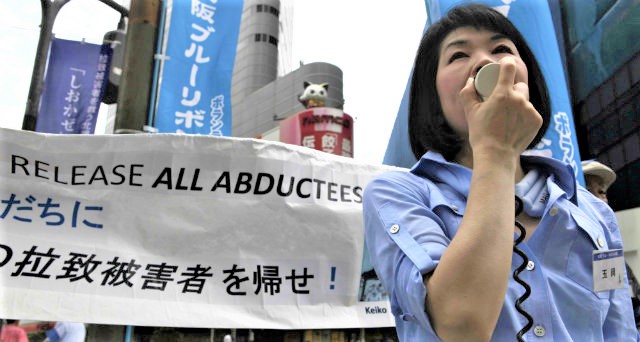
US-North Korea Meeting in June
This summit is an unprecedented opportunity for Japan, for which the resolution of the Japanese citizen abduction issue is of the utmost importance. On May 10, the U.S. initiated a telephone conference with Prime Minister Shinzo Abe, and President Trump reconfirmed his intention to cooperate in settling the abduction issue.
It will be indispensable to have the cooperation of not only the U.S., but also China, South Korea and Russia to achieve an early resolution of the abduction issue. I would like to share in the recognition that the international crime of abduction is a challenge to a universal value called human rights.
North Korea’s sudden peaceful attitude was elicited, of course, by the unyielding stance of the United States, which was also prepared to attack militarily. National Security Advisor John Bolton is known even inside the Republican Party as an extreme hard-liner. His appointment as the presidential adviser in charge of security measures bears heavy meaning.
Working together with Secretary of State Mike Pompeo, who has not relaxed his strict position on North Korea, Bolton supports diplomatic security measures as Trump’s closest associate. It can be said that North Korea’s stance toward the United States underwent unimaginable moderation, considering the swell of U.S.-North Korean military tensions.
The criticism that success has not been achieved with respect to the method of pressuring North Korea, which Japan has thus far consistently carried out, is misplaced. In addition to the unyielding stance of the United States, it is clear that the pressure put on North Korea by the international community, equal to that of an economic blockade, produced the recent changes in North Korea.
The United Nations’ sanctions decision last December were extremely strict, prohibiting almost all exports and imports, except a minimum oil supply, and sending home any North Korean workers that were abroad within two years. This change in attitude comes from the impending crisis of being cut off from its method of acquiring foreign currency, which would leave the economy no choice but to collapse.
The agenda and the meeting place for the U.S.-North Korea summit has been decided, but the course of the U.S.-North Korea conference is not yet known. The result hangs on whether or not Kim Jong Un, chairman of the Worker’s Party, will accept the United States’ demand for complete, verifiable and irreversible denuclearization.
It can be said that the abduction issue will certainly be raised in the discussion, but whether or not that will entail an early resolution is still unclear. Unfortunately, I have to say that the difference of understanding between Japan and North Korea concerning the abduction issue is great.
The current U.S. administration is more diligent and shows a powerful kind of sympathy compared to the successive administrations of the past regarding Japanese citizen abductions. I would like to see stronger cooperation between Japan and the U.S. in order to seize the coming opportunity to realize the family association’s greatest wish that all the abduction victims will be immediately returned to their country.*
Making partial concessions to North Korea would be turning a blind eye to future trouble. What North Korea wants more than anything else is nothing other than structural security from the U.S. and economic support from Japan. If we return to this starting point, then we can see the light with respect to resolving the abduction issue.
*Editor’s note: The author may be referring to the Association of Families of Victims Kidnapped by North Korea.

